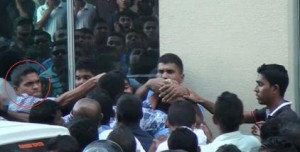Friday sermons will be delivered in English at one of the mosques in capital Male’ during Ramadan, the Islamic Ministry has reported, as the country prepares for the holy month.
Ramadan in 2012 will start on July 20 and will continue for 30 days until Saturday, August 18.
Minister of Islamic Affairs Sheikh Mohamed Shaheem Ali Saeed told local media that the ministry has received several requests for English sermons from expatriates living in Maldives.
“We have decided to try it out during Ramadan, because there are several foreign diplomats and teachers in Maldives,” Shaheem told Sun Online. “They don’t understand the sermon delivered in Dhivehi. They are more likely to be educated and informed if the sermon is given in English.”
Requests have been forwarded to the Al Azhar University to send scholars to deliver the sermons, the ministry says.
The mosque at which the Friday sermon will be delivered has not yet been disclosed.
Every Ramadan, Islamic Scholars from abroad visit Maldives for preaching and sometimes lead the congregation in the Taraweeh, special evening prayers in which long portions of the Qur’an are recited.
Ramadan is the ninth month of the Islamic calendar. It is a time of fasting, is one of the five pillars of Islam and represents a form of worship to Allah. Each day during this month, Muslims all over the world abstain from eating, drinking, sex, smoking, as well as participating in anything that is ill-natured or excessive; from dawn until the sun sets.
For centuries the locals have observed fasting with unique religious and non-religious traditions.
Maldivians make generous donations to Zakaath (Alms) funds and congregations at the mosques grow noticeably during Ramadan. Both expatriates and locals swarm the mosques, which offer dates and water for breaking the fast.
Furthermore, each year as Ramadan draws near, people buy new furniture and kitchenware and remake their homes – an opportunity the shops do not fail to take full advantage of.
Shops across the country, big or small, prepare for the “Pre-Ramadan shopping rush” with discounted prices and promotions. The largest crowd of shoppers will be spotted at the Night Market, annual bazaar organised by the Maldives National Chamber of Commerce and Industry (MNCCI). This year’s 10-day bazaar will open on July 1.
Meanwhile, the shops selling electronics to furniture have started their Ramadan sales.
The security forces will similarly gear up to patrol streets to keep the crime rates low, especially the robberies, while people are engaged in worship and work.
Allowances mandated to be paid under the Employment Act for Ramadan, short working hours, and the special discounted packages offered by service providers are also reasons why many eagerly await this month.
Restaurants are also seen changing menus and preparing the “breakfast buffet” adverts, as several families and friends gather in restaurants to break the fast outside homes. Those who stay at home, are likely to indulge in home-made buffet ranging from short eats to traditional curries and rice.
 Meanwhile, Ramadan means good business for the market in capital Male’, selling locally produced furits and vegetables. Several people swarm around the area to buy fresh and colorful papayas, bananas or – the Maldivian’s all-time favourite – watermelons, which are especially harvested on the islands for Ramadan.
Meanwhile, Ramadan means good business for the market in capital Male’, selling locally produced furits and vegetables. Several people swarm around the area to buy fresh and colorful papayas, bananas or – the Maldivian’s all-time favourite – watermelons, which are especially harvested on the islands for Ramadan.
Furthermore, an increase in evening sports events, and entertainment programs on TV channels are also elements families looks forward to during Ramadan – although some scholars have been critically outspoken about these “Non-Islamic” traditions.
After a month of fasting, the country will celebrate Eid ul-Fitr with millions of Muslim across the globe with prayers and festivities.
